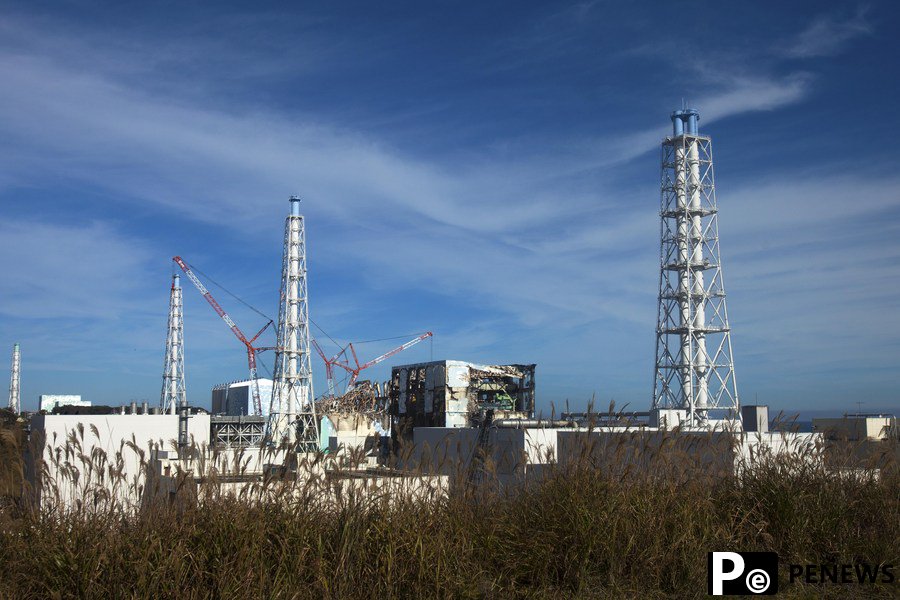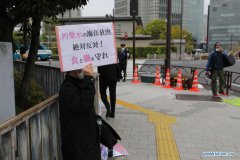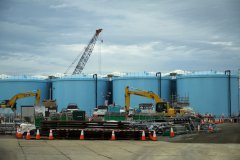Home>>
Japan's decision to dump Fukushima water into sea sparks domestic, int'l opposition(Xinhua) 09:02, April 14, 2021
-- The water has been treated using an advanced liquid processing system to remove most contaminants. However, things like tritium -- a radioactive byproduct of nuclear reactors -- are hard to filter out.
-- Japan had considered evaporating or storing underground the tritium-laced water from the plant as an alternative. However, the Japanese government decided to dilute the contaminated water and discharge it into the sea because it was more technically feasible and would save on costs
-- "The situation will continue to deteriorate further" as the nuclear wastewater, dumped from Fukushima prefecture, will circle around the entire Pacific Ocean in the long run, the environmentalist noted.
TOKYO, April 13 (Xinhua) -- Japanese Prime Minister Yoshihide Suga said on Tuesday that his government has decided to discharge contaminated radioactive wastewater in Fukushima Prefecture into the sea amid domestic and international opposition.
Suga made the announcement after convening a meeting of relevant ministers to formalize plans to release the radioactive water accumulated at the plant into the Pacific Ocean.
DECADE-LONG PROBLEM
Struck by a magnitude-9.0 earthquake and ensuing tsunami that hit Japan's northeast on March 11, 2011, the No. 1-3 reactors at the Fukushima Daiichi nuclear plant suffered core meltdowns.
The plant has been generating massive amount of radiation-tainted water since the accident happened as it needs water to cool the reactors. The plant's operator Tokyo Electric Power Company Holdings Inc. said it will take around two years for the release to start.

File photo taken on Nov. 12, 2011 shows the exterior of Fukushima Daiichi nuclear plant in Fukushima Prefecture, Japan. (Xinhua)
The water has been treated using an advanced liquid processing system to remove most contaminants. However, things like tritium -- a radioactive byproduct of nuclear reactors -- are hard to filter out.
According to some marine experts, traces of ruthenium, cobalt, strontium, and plutonium isotopes in the wastewater also raise concerns.
The plant has struggled to store the contaminated water in tanks at the plant where more than 1.25 million tons of contaminated water are currently stored, with the plant expected to reach capacity next year.
The operator claimed that the whole decommissioning process will be hampered if it needs to keep building storage tanks within the plant's premises.
Environmental groups, including Greenpeace, said the government should build more tanks to hold the water outside the plant instead of choosing the cheaper option of ocean release.
Japan had considered evaporating or storing underground the tritium-laced water from the plant as an alternative. However, the Japanese government decided to dilute the contaminated water and discharge it into the sea because it was more technically feasible and would save on costs.
Tritium is light and could reach as far afield as the U.S. west coast within two years, according to Ken Buesseler at Woods Hole Oceanographic Institution in Falmouth, Massachusetts.
A more serious matter lies in potentially more dangerous radionuclide in the water, including strontium-90 and iodine-129. While filtering has reduced their concentrations, around 70 percent of the water has yet to go through a secondary filtering process. "There are major questions as to whether it will work as planned," said Shaun Burnie at Greenpeace.
"Japan already contaminated and did damage to the ocean with the Fukushima power plant accident," Ahn Jae-hun, energy and climate change director at the Korea Federation for Environmental Movements, a green advocacy group in Seoul, told Xinhua over phone.
Citing government data from Japan, Ahn said a far higher level of radioactive isotope has been detected at the fishery products coming from Fukushima Prefecture than other areas in Japan.
"The situation will continue to deteriorate further" as the nuclear wastewater, dumped from Fukushima prefecture, will circle around the entire Pacific Ocean in the long run, the environmentalist noted.
Ahn urged Japan to disclose relevant information to neighboring countries, including China and South Korea, given that Tokyo's opacity fueled uncertainty and anxiety over the contamination.
Calling the irradiated sewage discharge "irresponsible," he warned that once the contaminated water flows into the ocean and the marine ecosystem is destroyed, it can never be restored.
LINGERING EROSION ON ECONOMIC RECOVERY
For a decade, the specter of nuclear contamination has emerged as an invisible obstacle to economic reconstruction in the disaster-stricken areas.
At first, people feared that agricultural products, aquatic products including vegetables and seafood, and even industrial products from the disaster areas were contaminated, which kept consumers away, leading to a further blow to the local economy.









